Demolition Contractors Rhondda
Top Demo Contractors in Rhondda
Get 3 FREE Demo Companies quotes for your project today! Compare profiles, reviews, accreditations, portfolio, etc... and choose the best offer.

Central Plant Hire
4.937 reviewsHolmbush Farm, Crawley Road, Holmbush Farm Crawley Road Faygate Horsham West Sussex, Horsham, RH12 4SE, GBCentral Plant Hire is a leading provider of plant and digger hire in West Sussex and Surrey. We offer a wide range of equipment to suit all your needs, from mini diggers to dumpers and attachments. We are committed to providing our customers with the highest quality equipment and service. Our team is experienced and knowledgeable, and we are always happy to answer your questions. We offer competitive rates and flexible hire options to suit your budget. We are proud to be a local business, and we are committed to supporting our community. We are a member of the Construction Industry Federation (CIF) and we are fully insured.
- Services
- Why Us?
- Accreditations
- Gallery
Get Quote
Bespoke Builders York
1Rotherham, GBAbout South Yorkshire Building Network Your building project deserves the best … Highest standard project management and workmanship Carefully matched to existing building style and materials Compliant with building regulations and codes of practice. Members of the South Yorkshire Building Network can undertake any construction project in South Yorkshire, and nothing is too small or too complicated. Be it renovations, woodwork, bathroom and kitchen fitting, extensions and conversions, plumbing or joinery, our approved panel of building contractors are here to build your perfect home using the latest designs, highest quality materials and all of our expertise! Our experienced builders will complete each stage of your domestic or commercial project, from the conception of the plumbing and heating system to the decorations to complicated electrical wiring. If you are looking for local builders in South Yorkshire, get in touch today. Our members are competitively priced with an excellent track record of customer satisfaction.
- Services
- Why Us?
- Gallery
Get Quote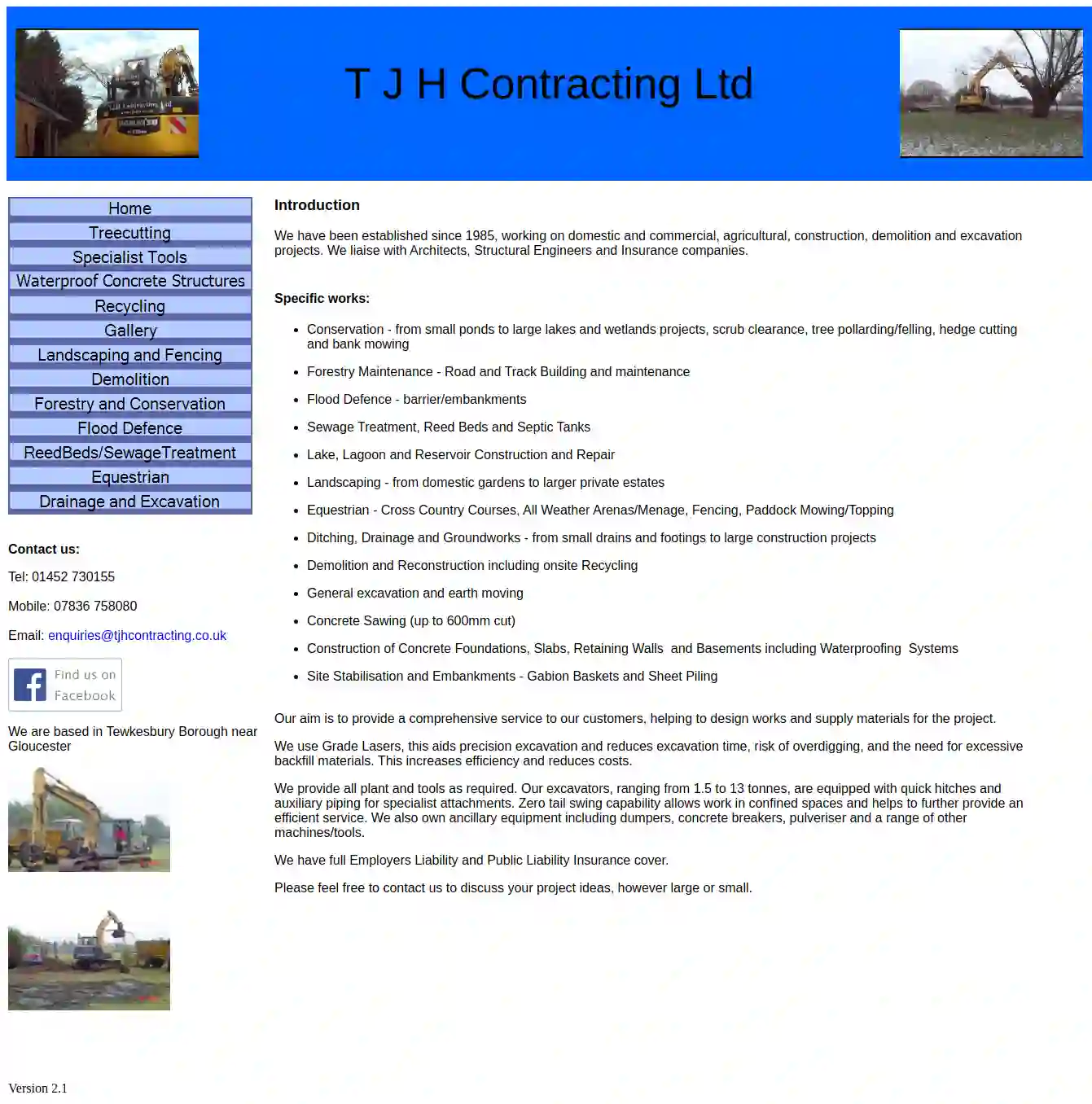
T J H Contracting Ltd
51 reviewsTewkesbury, GBAbout T J H Contracting Ltd T J H Contracting Ltd has been established since 1985, providing a comprehensive range of services for domestic, commercial, agricultural, construction, demolition, and excavation projects. We are based in Tewkesbury Borough near Gloucester and have a proven track record of working with Architects, Structural Engineers, and Insurance companies. Our commitment to quality and efficiency is evident in our use of Grade Lasers, which aid precision excavation, reduce excavation time, and minimize the need for excessive backfill materials. This approach increases efficiency and reduces costs for our clients. We are fully equipped with a range of plant and tools, including excavators ranging from 1.5 to 13 tonnes, equipped with quick hitches and auxiliary piping for specialist attachments. Our excavators' zero tail swing capability allows us to work in confined spaces, further enhancing our efficiency. We also own ancillary equipment such as dumpers, concrete breakers, pulverisers, and a variety of other machines and tools. We are fully insured with Employers Liability and Public Liability Insurance cover, providing peace of mind to our clients. We are passionate about providing a comprehensive service to our customers, helping to design works and supply materials for the project. We are dedicated to delivering high-quality results and exceeding our clients' expectations. Please feel free to contact us to discuss your project ideas, however large or small.
- Services
- Why Us?
- Gallery
Get Quote
A & J Truck and Bobcat Ltd. | Edmonton Slinger Services
53 reviewsEdmonton, GBAbout A&J Truck and Bobcat Ltd. A&J Truck and Bobcat Ltd. has been serving Edmonton and the surrounding region since 2004. We specialize in delivering and placing aggregates such as washrock, sand, and gravel for residential, commercial, and industrial projects. We use multicat technology to place your aggregates in minutes, eliminating the need for workers and increasing job site efficiency. Our fleet of stone slingers, dump trucks, and skid steers offer solutions for all stages of a construction project. We also provide a range of excavation, landscaping, and snow removal services catered to your needs. Our company meets all requirements for safety, insurance, and liability to ensure you and your company are protected. We offer quality service at a reasonable price and strive to provide client satisfaction.
- Services
- Why Us?
- Gallery
Get Quote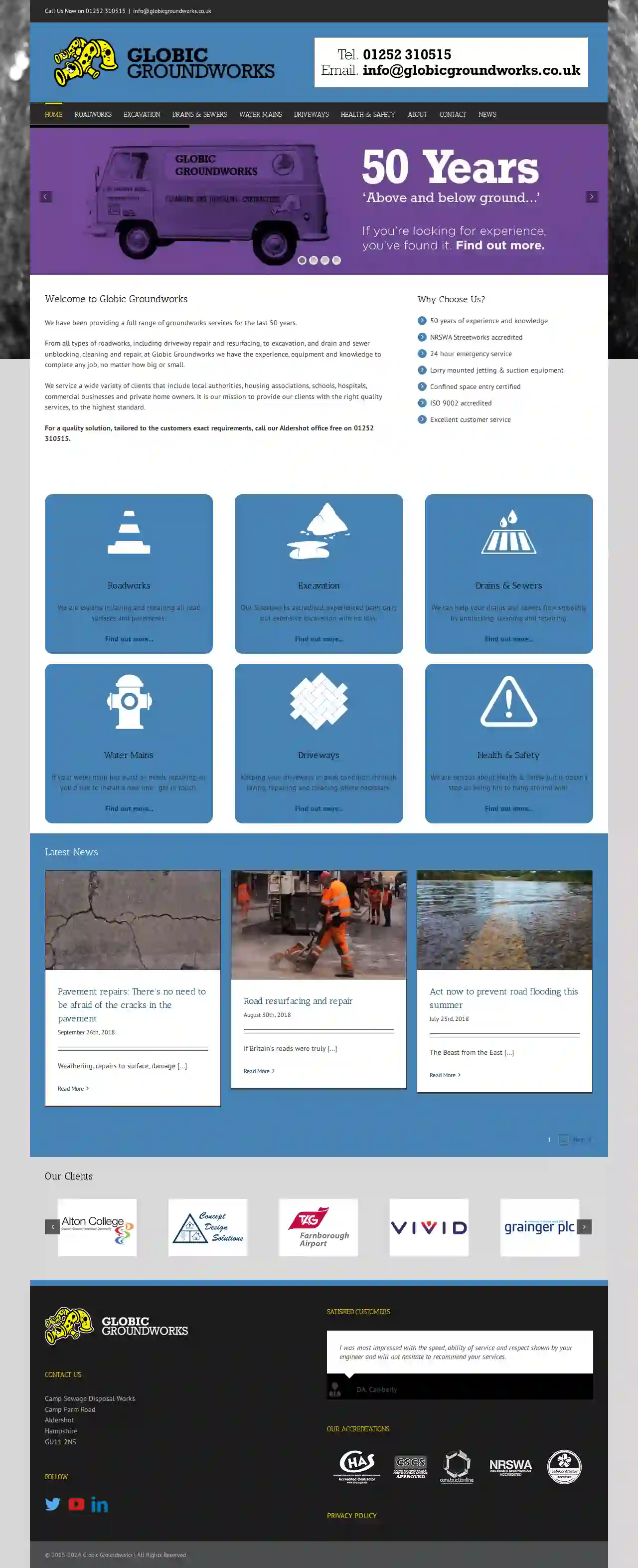
Globic Groundworks
1Camp Sewage Disposal Works, Camp Farm Road, Aldershot, GU11 2NS, GBWelcome to Globic Groundworks Globic Groundworks has been providing a comprehensive range of groundworks services for the past 50 years. From all types of roadworks, including driveway repair and resurfacing, to excavation, and drain and sewer unblocking, cleaning and repair, Globic Groundworks possesses the experience, equipment, and expertise to tackle any project, regardless of size. We cater to a diverse clientele, including local authorities, housing associations, schools, hospitals, commercial businesses, and private homeowners. Our unwavering commitment is to deliver high-quality services that meet the highest standards, exceeding our clients' expectations. For a tailored solution that precisely aligns with your specific requirements, contact our Aldershot office toll-free at 01252 310515.
- Services
- Why Us?
- Accreditations
- Testimonials
- Gallery
Get Quote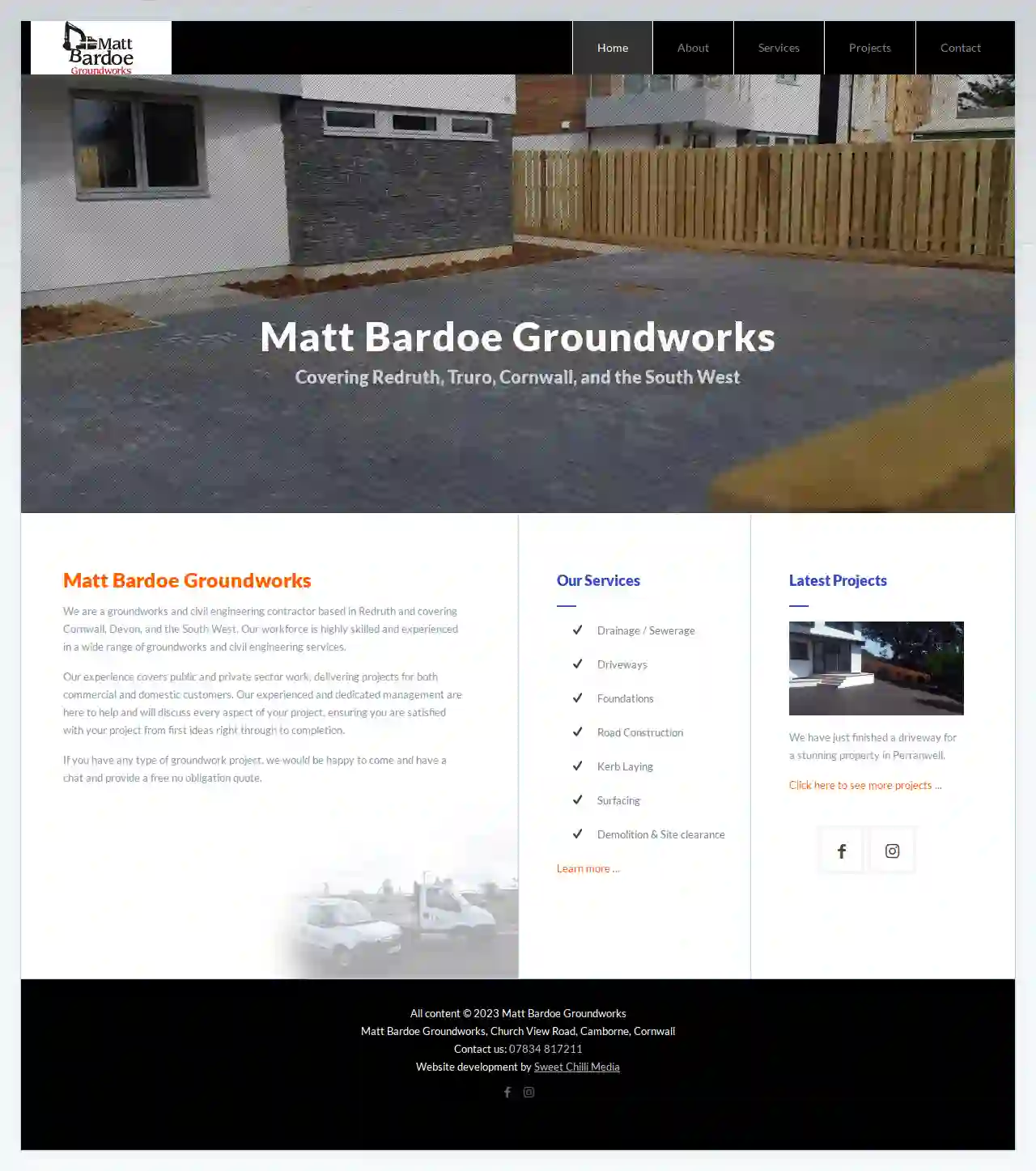
Matt Bardoe Groundworks
51 reviewsChurch View Road, Camborne, Cornwall, GBMatt Bardoe Groundworks We are a groundworks and civil engineering contractor based in Redruth and covering Cornwall, Devon, and the South West. Our workforce is highly skilled and experienced in a wide range of groundworks and civil engineering services. Our experience covers public and private sector work, delivering projects for both commercial and domestic customers. Our experienced and dedicated management are here to help and will discuss every aspect of your project, ensuring you are satisfied with your project from first ideas right through to completion. If you have any type of groundwork project, we would be happy to come and have a chat and provide a free no obligation quote.
- Services
- Why Us?
- Gallery
Get Quote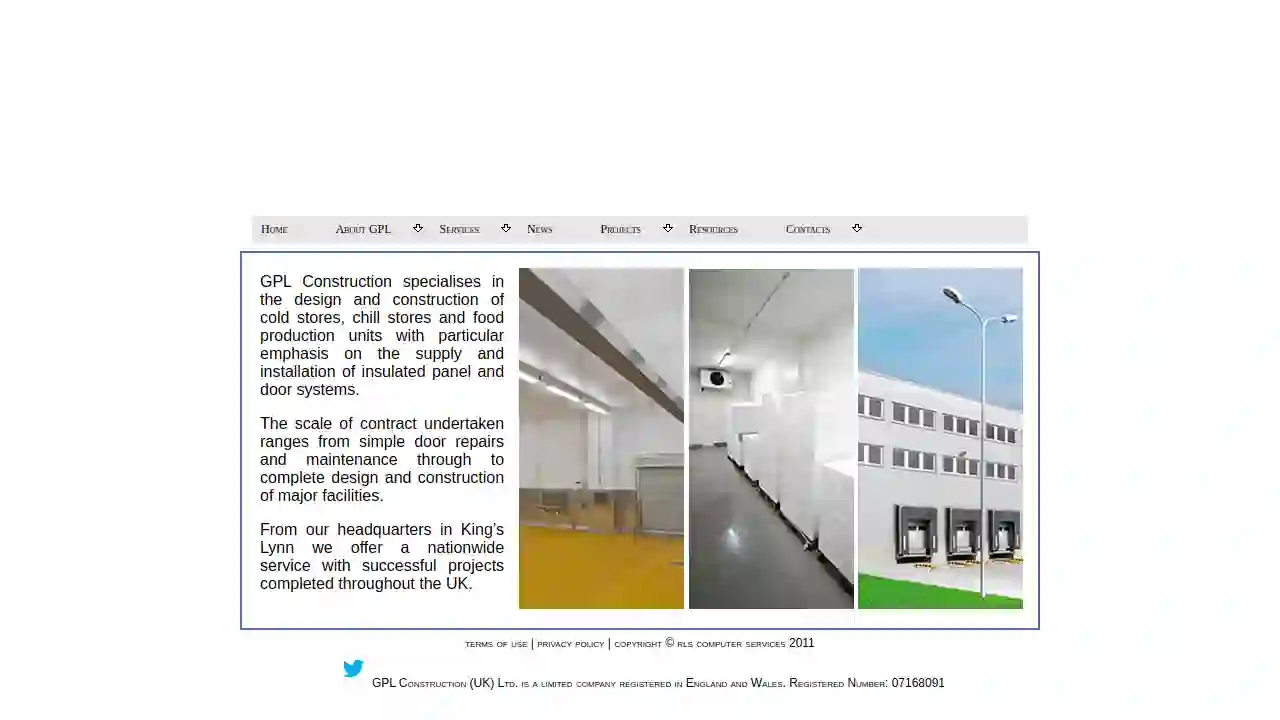
G P L Construction (UK) Ltd
51 reviews18 Hodgson Way, Hardwick Narrows, Kings Lynn, Norfolk, King's Lynn, PE30 4WR, GBGPL Construction: Your Trusted Partner for Cold Storage Solutions GPL Construction (UK) Ltd is a family-run business with over 22 years of experience in the design and construction of cold stores, chill stores, and food production units. We are firmly established as one of the UK's leading performers in our market, offering a nationwide service with a commitment to delivering quality projects on time, within budget, and with minimal disruption to our clients' existing operations. Our team of experienced, multi-skilled operatives share a common vision and commitment to delivering the highest standards. We pride ourselves on our exceptional customer service, reliability, and quality of work, ensuring that each project receives the same high level of attention, whether it's a simple repair or a large-scale design and build project. From our headquarters in King's Lynn, Norfolk, we have successfully completed projects throughout the UK, ranging from simple door repairs and maintenance to the complete design and construction of major facilities. We specialize in the supply and installation of insulated panel and door systems, and we are well-placed to select the best materials for individual contracts without being tied to a specific product range. Our commitment to continuous improvement is reflected in our regular review of health and safety policies and our ongoing training programs. We are an approved contractor under the SafeContractor Scheme, which assesses the health and safety competency of suppliers and their service providers. This accreditation is recognized by many large organizations as their primary means of selecting contractors. We are a progressive company and welcome the opportunity to talk to people who can offer GPL their wealth of experience, are well qualified, and pride themselves on having good standards of work.
- Services
- Why Us?
- Accreditations
- Our Team
- Gallery
Get Quote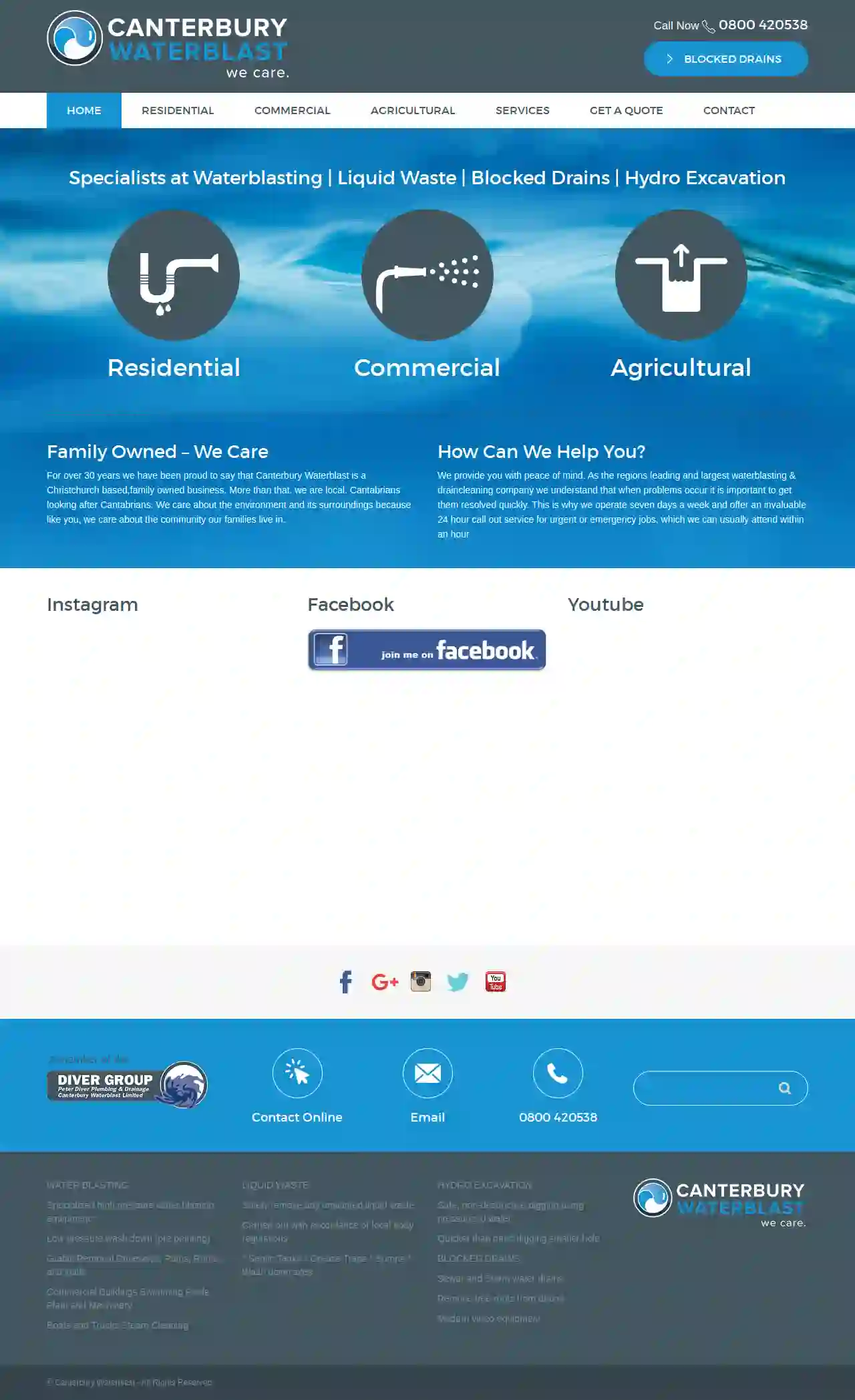
Canterbury Waterblast
4.648 reviews44 Maces Road, Christchurch, New Zealand, GBCanterbury Waterblast: Your Trusted Partner for Waterblasting, Drain Clearing, and Hydro Excavation For over 30 years, Canterbury Waterblast has been a family-owned and operated business serving the Christchurch community. We are committed to providing our customers with the highest quality service and workmanship, ensuring their peace of mind. As the region's leading and largest waterblasting and drain cleaning company, we understand the importance of prompt and efficient solutions. That's why we operate seven days a week and offer a 24-hour call-out service for urgent or emergency jobs, typically arriving within an hour. We are proud to be Cantabrians looking after Cantabrians, and we care deeply about the environment and the community we live in. Our team is dedicated to providing environmentally responsible solutions, using state-of-the-art equipment and techniques to minimize our impact. At Canterbury Waterblast, we are committed to our customers and will travel just about anywhere in the South Island. Contact us today to discover why we are Canterbury's first choice for waterblasting, drain clearing, and hydro excavation.
- Services
- Why Us?
- Gallery
Get Quote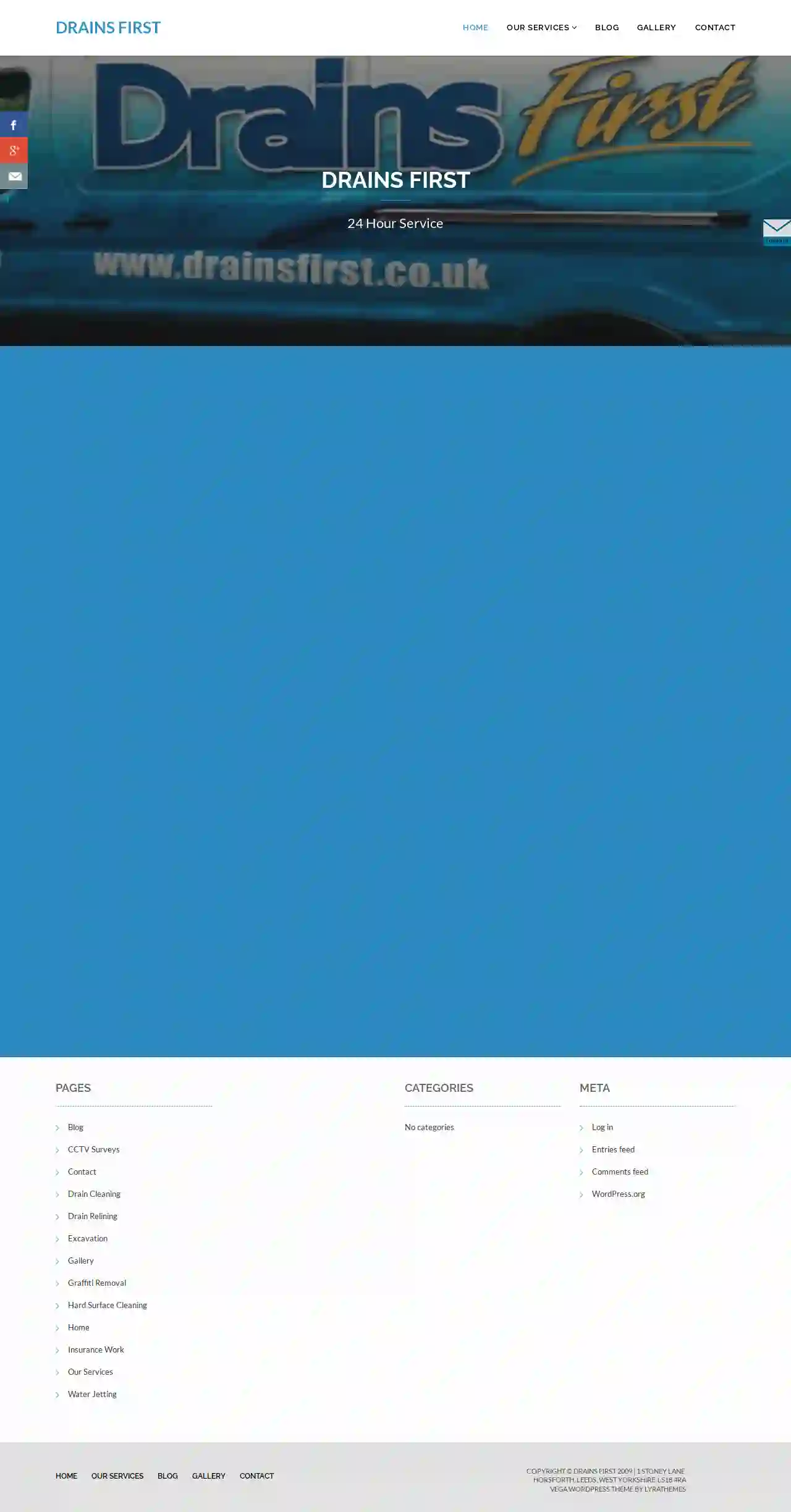
Drains First Ltd
4.824 reviews1 Stoney Lane, Horsforth, Leeds, West Yorkshire, LS18 4RA, GBDrains First provides emergency and planned maintenance service to commercial and domestic clients. We have over 30 years experience in drain maintenance and drain repair, all our technicians are friendly and professional, our methods are modern and efficient. We have a full range of modern drain cleaning equipment capable of cleaning any pipes and drains from a household sink to a 12″ sewer. All our vehicles are fitted with on board High Pressure Water Jetting Machines. Water jetting allows us to use high pressure water jets to clear blocked drains without the need for chemicals that can damage the environment. Drains First are specialists in CCTV surveys of drains, our highly qualified technicians can quickly identify problems such as blockages and damage without the need to dig into the ground to inspect the drain. Our engineers are extremely experienced in relining and excavation work with minimal disruption to the customer. Graffiti is an on going problem that can be unsightly, graffiti can be cleaned from most surfaces with the best possible results without unnecessary shadows. For examples of our work please visit our gallery.
- Services
- Why Us?
- Gallery
Get Quote
Stonehouse Groundworks Ltd
52 reviewsLancaster’s farm, Littleworth lane, Lancaster’s farmLittleworth lanePartridge greenHorsham, Horsham, RH13 8EJ, GBWelcome to Stonehouse Groundworks & Construction Stonehouse Construction Services is a highly reputable and well established groundworks company providing a comprehensive groundworks, civil engineering and demolition service to commercial, industrial and private customers throughout the South East. Started by Jake Lovelock, Stonehouse Groundworks Ltd was trading from 2004 and incorporated in 2007. At Stonehouse Groundworks & Construction Ltd all plant is owned and maintained by ourselves, giving us flexibility to deal with any size project in house. Our trained staff draw on years of experience within the industry. At Stonehouse Groundworks & Construction Ltd holds comprehensive £10M public liability insurance, giving all clients peace of mind.
- Services
- Why Us?
- Accreditations
- Gallery
Get Quote
Over 11,537+ Excavation Contractors in our network
Our excavation pros operate in Rhondda & surroundings!
ExcavationHQ has curated and vetted the Best Excavation Companies in Rhondda. Find a top & trustworthy pro today.
Frequently Asked Questions About Demolition Contractors
- Experience: Look for companies with a proven track record and years of experience in the demolition industry.
- Licensing and Insurance: Ensure the contractor is properly licensed to operate in your area and carries adequate insurance to protect you from liability.
- Safety Record: Inquire about their safety protocols and accident history. A reputable contractor prioritizes safety.
- References and Reviews: Ask for references from past clients and check online reviews to gauge their reputation and customer satisfaction.
- Professionalism: Choose a company that communicates clearly, provides detailed estimates, and has a courteous and responsive team.
- Permits and Regulations: Obtain all necessary demolition permits and comply with local building codes and environmental regulations.
- Contracts: Have a clear and comprehensive contract with the demolition contractor outlining the scope of work, payment terms, and liabilities.
- Environmental Laws: Comply with environmental laws regarding hazardous material removal, waste disposal, and pollution control.
- Neighboring Property Rights: Respect neighboring property rights and take measures to prevent damage or disruption to adjacent properties.
- Worker Safety: Adhere to worker safety regulations and provide a safe working environment for demolition crews.
- Size and Type of Structure: The method should be suitable for the structure's size, height, and construction materials.
- Site Location and Accessibility: The method should be feasible given the site's location, surrounding buildings, and access constraints.
- Environmental Considerations: Prioritize methods that minimize environmental impact, such as deconstruction or selective demolition if feasible.
- Budget: Different demolition methods have varying costs, so choose one that fits your budget.
- Safety: Prioritize methods that ensure worker safety and minimize risks to surrounding areas.
How long does a demolition project take?
How do I find a reputable demolition contractor?
What are the legal considerations for demolition projects?
How do I choose the right demolition method for my project?
How long does a demolition project take?
How do I find a reputable demolition contractor?
- Experience: Look for companies with a proven track record and years of experience in the demolition industry.
- Licensing and Insurance: Ensure the contractor is properly licensed to operate in your area and carries adequate insurance to protect you from liability.
- Safety Record: Inquire about their safety protocols and accident history. A reputable contractor prioritizes safety.
- References and Reviews: Ask for references from past clients and check online reviews to gauge their reputation and customer satisfaction.
- Professionalism: Choose a company that communicates clearly, provides detailed estimates, and has a courteous and responsive team.
What are the legal considerations for demolition projects?
- Permits and Regulations: Obtain all necessary demolition permits and comply with local building codes and environmental regulations.
- Contracts: Have a clear and comprehensive contract with the demolition contractor outlining the scope of work, payment terms, and liabilities.
- Environmental Laws: Comply with environmental laws regarding hazardous material removal, waste disposal, and pollution control.
- Neighboring Property Rights: Respect neighboring property rights and take measures to prevent damage or disruption to adjacent properties.
- Worker Safety: Adhere to worker safety regulations and provide a safe working environment for demolition crews.
How do I choose the right demolition method for my project?
- Size and Type of Structure: The method should be suitable for the structure's size, height, and construction materials.
- Site Location and Accessibility: The method should be feasible given the site's location, surrounding buildings, and access constraints.
- Environmental Considerations: Prioritize methods that minimize environmental impact, such as deconstruction or selective demolition if feasible.
- Budget: Different demolition methods have varying costs, so choose one that fits your budget.
- Safety: Prioritize methods that ensure worker safety and minimize risks to surrounding areas.